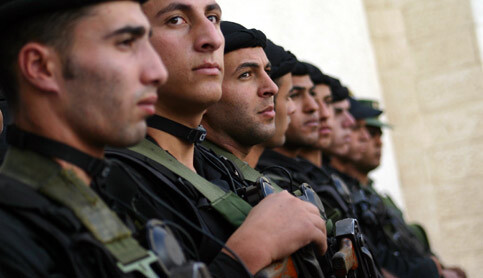The Electronic Intifada 19 October 2006

Palestinian presidential guards observe a women’s protest calling for unity between Palestinian lawmakers and politicians outside the presidential headquarters in the West Bank city of Ramallah, 18 October 2006. (MaanImages/Fadi Arouri)
Palestinian nationalist and Islamic leaders have strongly denounced efforts by the Central Intelligence Agency (CIA) and affiliated foreign aide bodies to recruit Palestinian journalists, politicians and certain political groups to work against the Islamic group Hamas.
Western news agencies last Friday reported that the US was quietly starting a campaign projected to cost up to $42 million to bolster Hamas’s political opponents ahead of possible early elections.
The plan includes funding the Fatah group, providing training as well as offering “strategic advice” to politicians and some liberal secular parties opposed to Hamas.
Some of the funds will also go to journalists as well as radio and TV stations that agree to work against Hamas by portraying the Islamic movement in bad light.
A knowledgeable source in Ramallah intimated that some of the money would go to fund the launching of an anti-Hamas satellite TV station in the West Bank.
The new outlet ostensibly would serve as a counterweight to a planned satellite TV run by Hamas and based in Dubai.
“We know very well that American money goes hand in hand with American agenda. We also know that unclean money goes to unclean parties and unclean politicians and unclean journalists,” said Hasan Khreishe, deputy-speaker of the Palestinian Legislative Council.
Khreishe, who was abducted from his home by the Israeli occupation army in July and imprisoned for several weeks for taking part in the Hamas-led government, accused the American administration of “wanting to morph the Palestinian society into a mercenary society.”
“The Americans claim that this money will restructure certain Palestinian political parties, but I’m sure that the opposite will happen. These bribes will only corrode, corrupt and eventually destroy these parties since they will lose whatever respect and stature among the Palestinian masses.”
Veteran Fatah leader and former lawmaker Hatem Abdul Kader concurs.
“I have no doubt that any party or even individual receiving money from external sources will incur the wrath of the Palestinian people and suffer immense social and political damage.
“It would be a virtual political suicide.”
Abdul Kader said he didn’t think that “the real Fatah” will allow itself to be corrupted by CIA money.
“I am not sure about the authenticity of the report. It could be that things are blown out of proportion.”
Hamas leaders have castigated “the CIA conspiracy” against the Palestinian people.
“They are trying to buy off a few political mercenaries here and there. But I assure them that our people are not stupid and naive. America’s agents, like Israel’s agents, will be thrown away like you dump a filthy rug into the garbage container,” said Ibrahim Suleiman, a Hamas spokesman in the Hebron region.
“America’s agents and collaborators are being discarded everywhere in the world. Do you think they will prosper here in Palestine? Have the Palestinian people forgotten what American has been doing and is doing to them?”
US officials, while acknowledging the existence of the “aid program,” have nonetheless sought to downplay the growing controversy surrounding it.
US Consol General in Jerusalem Jacob Walles was quoted by Reuters as saying that “there is nothing new here. The U.S. has operated programs in the West Bank and Gaza Strip for many years to promote development of political parties and civil society organizations.”
Earlier this year, the US reportedly paid several millions of dollars to finance the election campaigns of several Fatah and other candidates.
The affair, then reported widely in the occupied Palestinian territories, proved embarrassing for the candidates and some observers contend might have contributed to their defeat by Hamas candidates especially in local electoral circles.
This week, the U.S.-based National Democratic Institute, which is closely affiliated with the State Department, held talks with the leaders of Fatah and a number of other non-Islamic politicians on how they could improve their performance in any prospective election.
One piece advice being offered is how Fatah could emulate Hamas’s election tactics by running fewer candidates per district and by fielding religious-looking women to campaign door-to-door especially with conservative households.
According to reliable sources in Ramallah, the $42-million fund is part of a larger American scheme aimed at strengthening PA President Mahmoud Abbas not only against Hamas but also against his opponents within Fatah, including supporters of the Tunis-based Farouq al-Qaddumi, the more-or-less nominal chief of the Fatah movement.
Qaddumi is firmly against the dissolution of the current Hamas-led government. He also strongly condemned the burning by Fatah activists of government buildings in Ramallah a few weeks ago.
Abbas’s Presidential Guard has already received a significant amount of light weaponry such as assault rifles and ammunitions, all in coordination with Israel.
Last week, Gaza journalist Imad Afaneh reported that a shipment of four containers of Russian-made rifles and ammunitions arrived from Israel via the Nahal OZ (or Mintar Crossing) and headed for the headquarters of Presidential Security at Ansar in Gaza City.
The weapons reportedly were handed to Fatah activists and cadres with many rifles sold at reduced prices.
The report has been denied by PA spokespersons, who described it as “speculations.”
Khalid Amayreh is a professional journalist and political analyst from Dura, 10 km. south west of Hebron in the West Bank. His writings appear frequently in Al-Ahram Weekly and Al-Jazeera.





